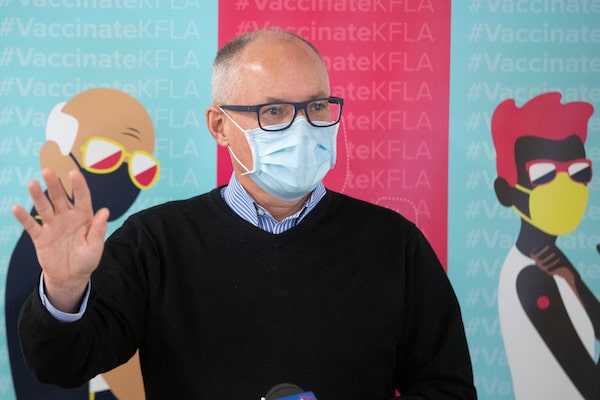
Medical officer of Health for Kingston, Frontenac, Lennox and Addington health unit, Dr. Kieran Moore, at the Strathcona Paper Centre in Napanee, Ontario, on March 15, 2021.Lars Hagberg/The Canadian Press
The doctor slated to take over for beleaguered Ontario Chief Medical of Health David Williams is known for a mastery of disease surveillance, pandemic statistics and YouTube – a résumé that has received near-universal approval from the province’s public-health community.
Kieran Moore has served as Medical Officer of Health for Kingston, Frontenac, Lennox & Addington Public Health since 2017. The low provincial profile he maintained as top doctor in the region of 200,000 people has grown significantly since the pandemic began early last year and his region defied the heavy caseloads of Montreal, Toronto and other nearby cities.
In the early days of the pandemic, Dr. Moore redeployed the public-health unit’s food safety inspectors to do infection prevention at the region’s long-term care homes. He also met with medical directors of the homes on a weekly basis to keep them informed on the latest directives and statistics, working relationships he’d formed long before the pandemic.
Canada vaccine tracker: How many COVID-19 doses have been administered so far?
COVID-19 news: Updates and essential resources about the pandemic
“I know all the medical directors,” he testified before Ontario’s Long-Term Care COVID-19 Commission. “... And really, if you’re going to have success, you have to have pre-existing partnerships.”
That attitude of open communication and collaboration is the biggest change Dr. Moore is expected to bring to Queen’s Park when he’s scheduled to assume the office from Dr. Williams on June 26. For more than a year, a broad range of factions has questioned whether he possesses the expertise and communication ability to keep a confounding new virus at bay.
“We have been asking on behalf of our nurses for his replacement since April of 2020,” said Doris Grinspun, chief executive officer of the Registered Nurses’ Association of Ontario. “For me it was a failure of content in his message and just confusing communication.”
The Long-Term Care COVID-19 Commission’s final report states that Dr. Williams “failed to issue directives to ensure a consistent response to COVID-19 in long-term care homes,” leading to confusion among long-term care staff over “who was in charge at the provincial level and what advice they should be following.”
In a statement announcing Dr. Williams’s retirement, Health Minister Christine Elliott praised him for “his dedication to safeguarding the health and safety of Ontarians during his many years of service.”
Locally, Dr. Moore became known as much for his swift behind-the-scenes actions as for his YouTube appearances featuring some coloured markers and a well-used paper flip-board.
“He’s become famous for those videos,” said Ian Gemmill, who was Dr. Moore’s predecessor in the Kingston job and helped train him in the role. “He’s educating the community in very simple, easy to understand terms. And I think that’s the key because the messages have been very confusing. "
While the virus tore through the province’s long-term care homes, killing nearly 4,000 residents (and taking 8,744 lives in total), Kingston recorded no deaths or major outbreaks in long-term care, and just three COVID-19 deaths over all. The region currently has 11 active cases.
Dr. Moore was an emergency room physician before moving into public health.
“Like many of us I think he saw the light at some point and decided instead of treating the heart attacks coming through the door he could prevent the heart disease in the first place,” Dr. Gemmill said.
At least one of his public-health innovations is in use across the province. When hospital patients answer triage questions about their condition, some of the information is anonymized and fed into a provincial surveillance system called the Acute Care Enhanced Surveillance, or ACES, that acts as an early-warning system for disease outbreaks or other public-health threats. The system began as a 2004 pilot project hatched by Dr. Moore.
“From a COVID standpoint, he knows the data very well,” said Isaac Bogoch, an infectious-diseases physician who sits with Dr. Moore on Ontario’s vaccine task force. “He’s up to date. He knows what’s happening all over the world. And he’s great to work with.”
Dr. Moore arrives at a hopeful but precarious time. Residents have been promised a relatively normal summer, but much depends on vaccine rollouts and keeping on top of new variants. That could play to his strengths.
“He’s been a very effective advocate for making sure that we’re doing a good job with surveillance at the border,” said Irfan Dhalla, a physician and vice-president with the Unity Health Toronto network of hospitals who sits on a federal COVID-19 screening panel with Dr. Moore. “That’s an area that’s going to be increasingly important over the coming months.”
Our Morning Update and Evening Update newsletters are written by Globe editors, giving you a concise summary of the day’s most important headlines. Sign up today.